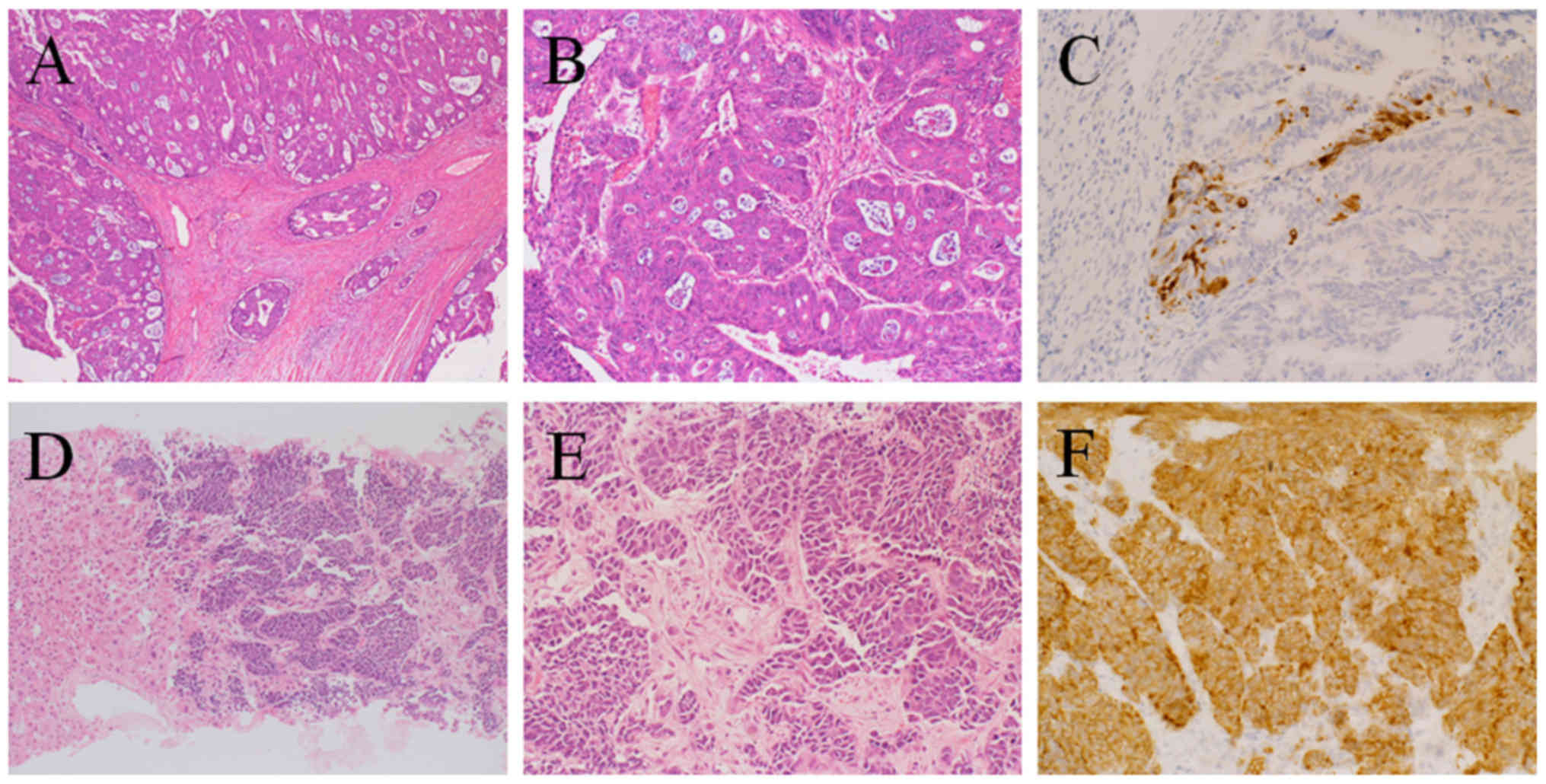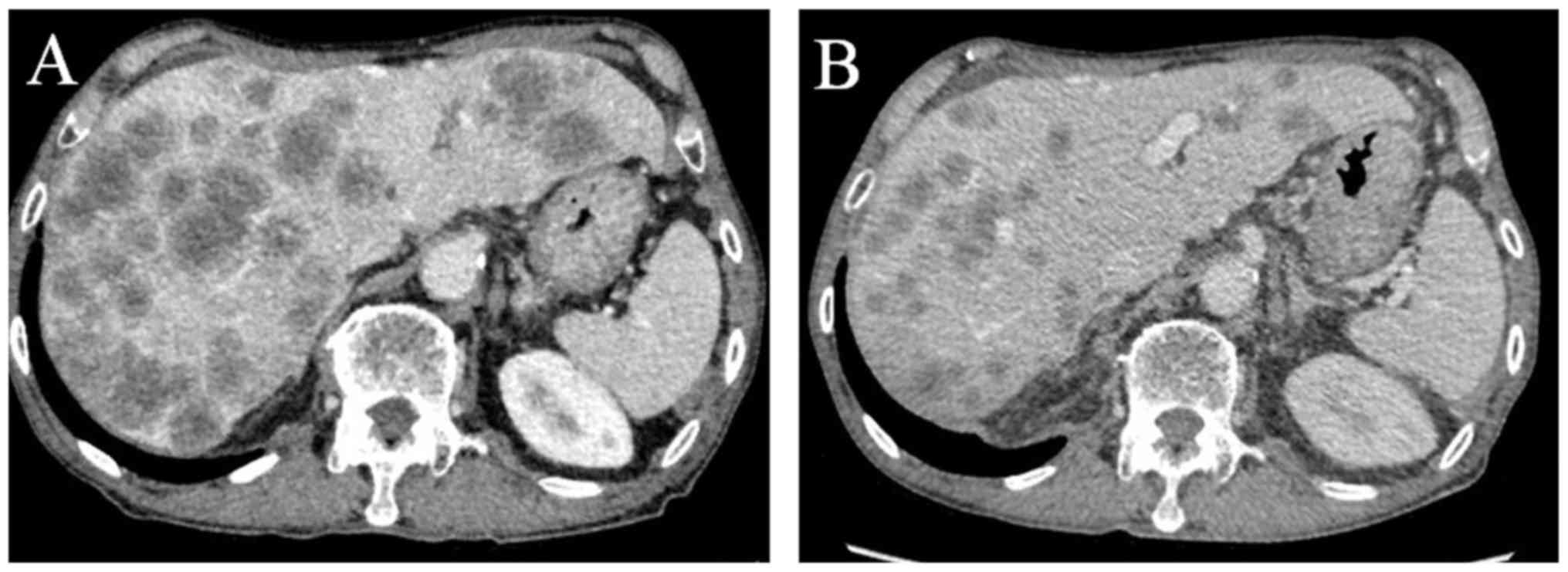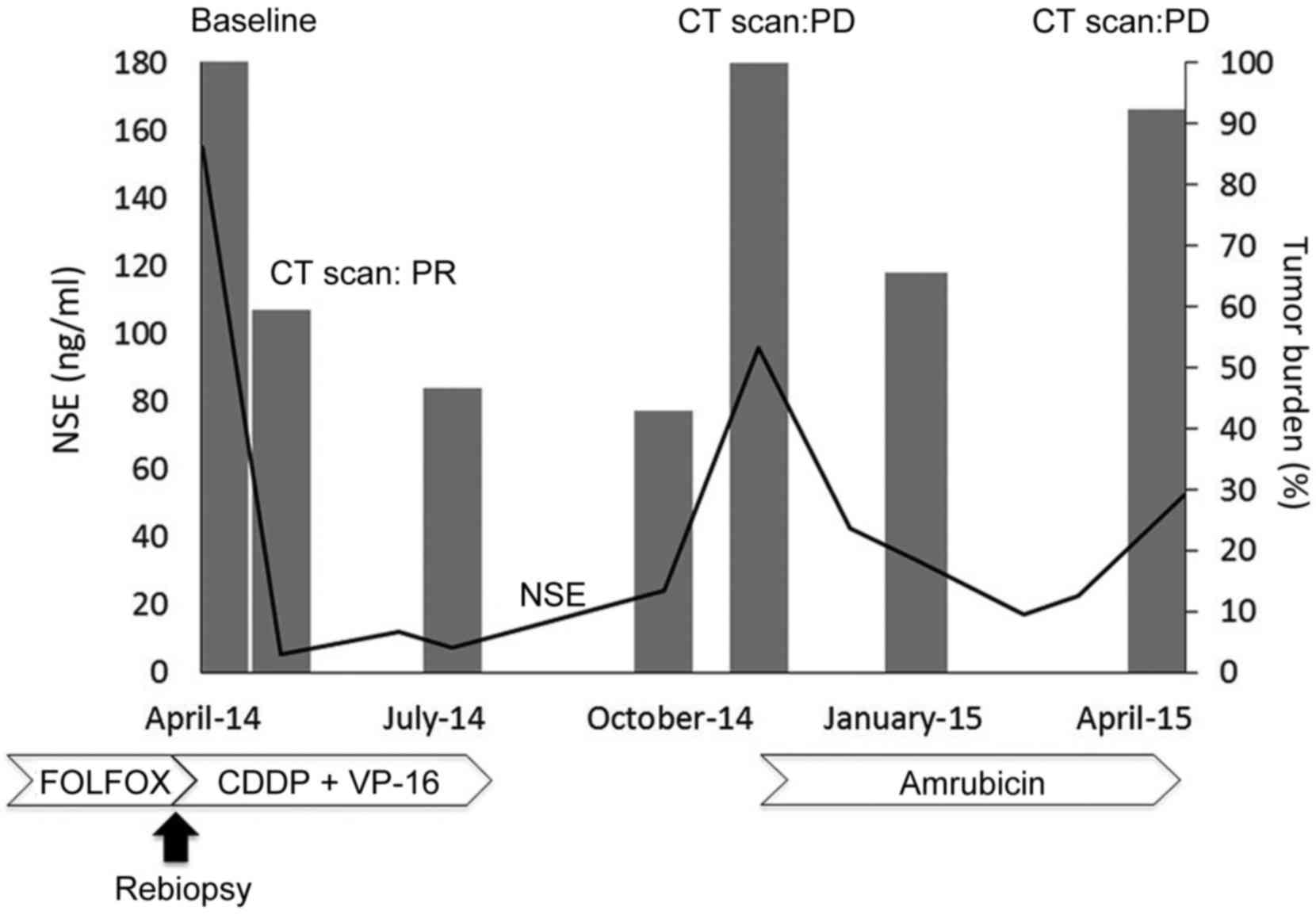|
1
|
National Comprehensive Cancer Network, .
NCCN Clinical Practice Guidelines in OncologyInvasive Breast
Cancer. version 3; BINV-17, MS-45. Fort Washington: 2015
|
|
2
|
National Comprehensive Cancer Network
(NCCN), . NCCN Clinical Practice Guidelines in OncologyNon Small
Cell Lung Cancer. version 1. Fort Washington: NSCL-16; 2016
|
|
3
|
National Comprehensive Cancer Network, .
NCCN Clinical Practise Guidelines in OncologyProstate Cancer.
version 1; PROS-9, MS-32. Fort Washington: 2016
|
|
4
|
National Comprehensive Cancer Network, .
NCCN Clinical Practice Guidelines in OncologyColon Cancer. version
1; COL-9, 11, COL-C 1 of 9. Fort Washington: 2016
|
|
5
|
National Comprehensive Cancer Network, .
NCCN Clinical Practice Guidelines in OncologyRectal Cancer. version
1. REC-9, 11, MS37-MS38. Fort Washington: 2016
|
|
6
|
Bernick PE, Klimstra DS, Shia J, Minsky B,
Saltz L, Shi W, Thaler H, Guillem J, Paty P, Cohen AM and Wong WD:
Neuroendocrine carcinomas of the colon and rectum. Dis Colon Retum.
47:163–169. 2004. View Article : Google Scholar
|
|
7
|
Shafqat H, Ali S, Salhab M and Olszewski
AJ: Survival of patients with neuroendocrine carcinoma of the colon
and rectum: A population-based analysis. Dis Colon Rectum.
58:294–303. 2015. View Article : Google Scholar : PubMed/NCBI
|
|
8
|
Therasse P, Arbuck SG, Eisenhauer EA,
Wanders J, Kaplan RS, Rubinstein L, Verweij J, Van Glabbeke M, van
Oosterom AT, Christian MC and Gwyther SG: New guidelines to
evaluate the response to treatment in solid tumors. J Natl Cancer
Inst. 92:205–216. 2000. View Article : Google Scholar
|
|
9
|
Volante M, Marci V, Andrejevic-Blant S,
Tavaglione V, Sculli MC, Tampellini M and Papotti M: Increased
neuroendocrine cells in resected metastases compared to primary
colorectal adenocarcinomas. Virchows Arch. 457:521–527. 2010.
View Article : Google Scholar : PubMed/NCBI
|
|
10
|
Shia J, Tickoo SK, Guillem JG, Qin J,
Nissan A, Hoos A, Stojadinovic A, Ruo L, Wong WD, Paty PB, et al:
Increased endocrine cells in treated rectal adenocarcinomas: A
possible reflection of endocrine differentiation in tumor cells
induced by chemotherapy and radiotherapy. Am J Surg Pathol.
26:863–872. 2002. View Article : Google Scholar : PubMed/NCBI
|
|
11
|
Tampellini M, Brizzi MP, Bitossi R,
Alabiso I, Sculli CM, Chiusa L, Papotti M and Dogliotti L: Six-year
stabilisation of a relapsed pelvic mass from rectal cancer after
oxaliplatin-containing chemotherapy. J Cancer Res Clin Oncol.
133:783–785. 2007. View Article : Google Scholar : PubMed/NCBI
|
|
12
|
Tagawa ST: Neuroendocrine prostate cancer
after hormonal therapy: Knowing is half the battle. J Clin Oncol.
32:3360–3364. 2014. View Article : Google Scholar : PubMed/NCBI
|
|
13
|
Amir E, Clemons M, Purdie CA, Miller N,
Quinlan P, Geddie W, Coleman RE, Freedman OC, Jordan LB and
Thompson AM: Tissue confirmation of disease recurrence in breast
cancer patients: Pooled analysis of multi-centre,
multi-disciplinary prospective studies. Cancer Treat Rev.
38:708–714. 2012. View Article : Google Scholar : PubMed/NCBI
|
|
14
|
Simmons C, Miller N, Geddie W, Gianfelice
D, Oldfield M, Dranitsaris G and Clemons MJ: Does confirmatory
tumor biopsy alter the management of breast cancer patients with
distant metastases? Ann Oncol. 20:1499–1504. 2009. View Article : Google Scholar : PubMed/NCBI
|
|
15
|
Van Poznak C, Somerfield MR, Bast RC,
Cristofanilli M, Goetz MP, Gonzalez-Angulo AM, Hicks DG, Hill EG,
Liu MC, Lucas W, et al: Use of biomarkers to guide decisions on
systemic therapy for women with metastatic breast cancer: American
Society of Clinical Oncology Clinical Practice Guideline. J Clin
Oncol. 33:2695–2704. 2015. View Article : Google Scholar : PubMed/NCBI
|
|
16
|
Cardoso F, Costa A, Norton L, Senkus E,
Aapro M, André F, Barrios CH, Bergh J, Biganzoli L, Blackwell KL,
et al: ESO-ESMO 2nd international consensus guidelines for advanced
breast cancer (ABC2)†. Ann Oncol. 25:1871–1888. 2014. View Article : Google Scholar : PubMed/NCBI
|
|
17
|
Sun JM, Ahn MJ, Choi YL, Ahn JS and Park
K: Clinical implications of T790M mutation in patients with
acquired resistance to EGFR tyrosine kinase inhibitors. Lung
Cancer. 82:294–298. 2013. View Article : Google Scholar : PubMed/NCBI
|
|
18
|
Chouaid C, Dujon C, Do P, Monnet I,
Madroszyk A, Le Caer H, Auliac JB, Berard H, Thomas P, Lena H, et
al: Feasibility and clinical impact of re-biopsy in advanced non
small-cell lung cancer: a prospective multicenter study in a
real-world setting (GFPC study 12–01). Lung Cancer. 86:170–173.
2014. View Article : Google Scholar : PubMed/NCBI
|
|
19
|
Crystal AS, Shaw AT, Sequist LV, Friboulet
L, Niederst MJ, Lockerman EL, Frias RL, Gainor JF, Amzallag A,
Greninger P, et al: Patient-derived models of acquired resistance
can identify effective drug combinations for cancer. Science.
346:1480–1486. 2014. View Article : Google Scholar : PubMed/NCBI
|
|
20
|
Beltran H, Tagawa ST, Park K, MacDonald T,
Milowsky MI, Mosquera JM, Rubin MA and Nanus DM: Challenges in
recognizing treatment-related neuroendocrine prostate cancer. J
Clin Oncol. 30:e386–e389. 2012. View Article : Google Scholar : PubMed/NCBI
|
|
21
|
Tórtola S, Steinert R, Hantschick M,
Peinado MA, Gastinger I, Stosiek P, Lippert H, Schlegel W and
Reymond MA: Discordance between K-ras mutations in bone marrow
micrometastases and the primary tumor in colorectal cancer. J Clin
Oncol. 19:2837–7843. 2001. View Article : Google Scholar : PubMed/NCBI
|
|
22
|
Zauber P, Sabbath-Solitare M, Marotta SP
and Bishop DT: Molecular changes in the Ki-ras and APC genes in
primary colorectal carcinoma and synchronous metastases compared
with the findings in accompanying adenomas. Mol Pathol. 56:137–140.
2003. View Article : Google Scholar : PubMed/NCBI
|
|
23
|
Albanese I, Scibetta AG, Migliavacca M,
Russo A, Bazan V, Tomasino RM, Colomba P, Tagliavia M and La Farina
M: Heterogeneity within and between primary colorectal carcinomas
and matched metastases as revealed by analysis of Ki-ras and p53
mutations. Biochem Biophys Res Commun. 325:784–791. 2004.
View Article : Google Scholar : PubMed/NCBI
|
|
24
|
Baas JM, Krens LL, Guchelaar HJ, Morreau H
and Gelderblom H: Concordance of predictive markers for EGFR
inhibitors in primary tumors and metastases in colorectal cancer: A
review. Oncologist. 16:1239–1249. 2011. View Article : Google Scholar : PubMed/NCBI
|
|
25
|
Khasraw M, Brogi E and Seidman AD: The
need to examine metastatic tissue at the time of progression of
breast cancer: Is rebiopsy a necessity or a luxury? Curr Oncol Rep.
13:17–25. 2011. View Article : Google Scholar : PubMed/NCBI
|
|
26
|
Reck M, Popat S, Reinmuth N, De Ruysscher
D, Kerr KM and Peters S: ESMO Guidelines Working Group: Metastatic
non-small-cell lung cancer (NSCLC): ESMO clinical Practice
guidelines for diagnosis, treatment and follow-up. Ann Oncol.
25:(Suppl 3). iii27–iii39. 2014. View Article : Google Scholar : PubMed/NCBI
|
|
27
|
Palmgren JS, Karavadia SS and Wakefield
MR: Unusual and underappreciated: Small cell carcinoma of the
prostate. Semin Oncol. 34:22–29. 2007. View Article : Google Scholar : PubMed/NCBI
|

















